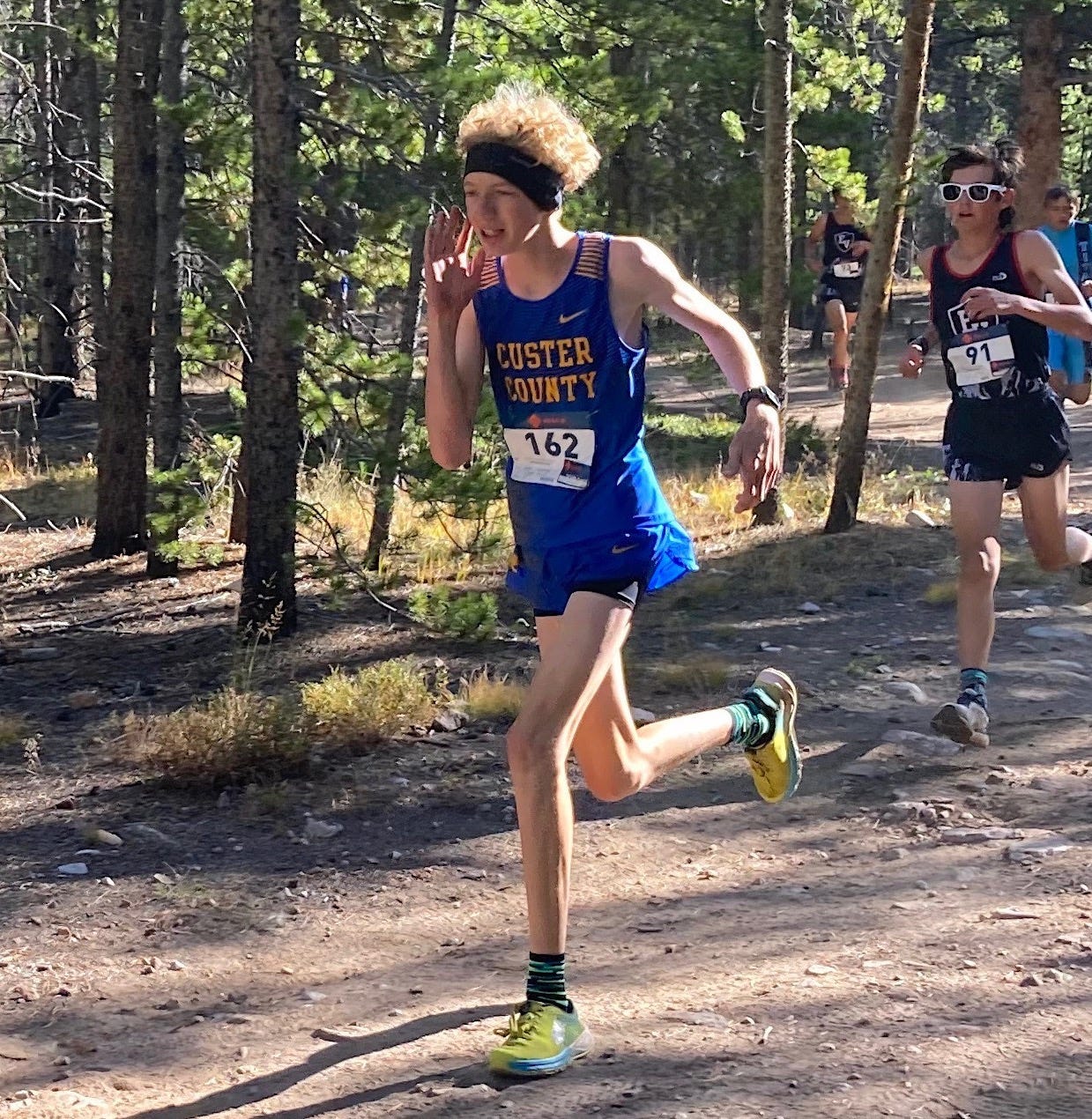Harrison’s high school years all blended into what seemed like one big season of running with upwards of 150 cross-country and track races. His nickname became “The Blur,” something I came up with because his unique running form reminded me of an old buddy who went by that tag — and who also had some interesting quirks. Through a succession of changes, as first Jack Swartz, and then Jesse Taylor, moved on to other jobs, I found myself as head cross-country coach and assistant track coach along with head track coach Joy Parrish, of the Custer County Bobcats. I had learned a great deal from these two collegiate All-Americans and added that to my own base of knowledge about running and fitness which came from training for marathons, pack-burro races, ultramarathons, cycling, cross-country skiing and endurance multi-sport competitions.
When my first track season as an official coach rolled around, Harrison was a freshman and the only distance runner to turn out for the small team that also included sprinters, hurdlers, jumpers and throwers. It was a remarkable situation that as distance coach I was able to coach my own son, one-on-one. In the spring our dirt track at 7,800 feet altitude was often a quarter-mile oval of wind-swept ice, drifted snow and mud, and not runnable. I improvised with workouts on paved streets in Westcliffe, utilizing straight-aways and a loop around the local park as a makeshift track. With two weeks of practice behind us, our first meet loomed and none of our team had even set foot on a proper track. I signed Harrison up for four distance events — the 1600, 400, 800 and 3200 — figuring he had no chance of placing but could gain from the experience and it was all good training. Over the years running four events, including relays, would be standard for him in track.
My first season as head coach of the cross-country team, when Harrison was a sophomore, was about building my own confidence as much as that of my runners. That fall Micah Zeller returned as a junior after spending a semester in Wyoming, and we had a whole cast of other characters too, mostly schoolmates Harrison had known all his life. Micah was a rare athlete, a raw combination of physically and mental running talent that many coaches never have the opportunity to work with.
Our tight-knit distance squad struggled through the Covid year, missed an entire season of track in 2020, and followed the mask rules in cross-country and track in fall of 2020 and spring 2021. I would eventually be blessed with coaching Micah to second place at the 2A State Cross-Country Championships and the 2A State Track Championship in the 3200 meters his senior year.
Harrison’s high school years streamed by like some sort of strange independent film, an improbable story of someone doing the impossible. There were setbacks and little victories. Often I felt like I had two jobs — managing Harrison and coaching the rest of the team. And I also regularly drove the bus. Typically the biggest challenge was getting him out the door and to the starting line. I could breathe easy after the gun went off. He was inspiring people with autism and without. He scored points consistently in cross-country and especially at small track meets where he sometimes was among only a few runners to show up for the 3200 meters.
At one track meet at Fairplay his junior year, when Micah opted to sit out the 3200 meters, Harrison was the only runner to compete at that distance. With Fairplay, Colorado, having the highest-altitude certified track in the world at nearly 10,000 feet, Harrison ran what was considered the high-school record for the highest-altitude 3200 meters. The refs let Micah ring the bell for the final lap and Harrison finished under a human bridge formed by his teammates’ extended arms. Dozens memories like this were already making it difficult to for me to let go of this experience, and Harrison still had his senior year left.
When colleges started recruiting Micah, I got a first-hand look at how that system worked. We toured Western Colorado University, where I hoped he’d go, then he decided to sign with Adams State University. Ultimately Micah changed his focus and opted to join the U.S. Coast Guard. Suddenly my top runner was gone and my focus was on Harrison’s senior year, as well as his other teammates who were now juniors. I believe having a front-row seat to Micah’s college recruitment process put the idea of running in college into Harrison’s head, and mine too. This notion sort of became stuck in my brain and took hold. It suddenly seemed important to me that Harrison give college a try when it had never even been a consideration. But was this realistic for him? My own college experience a the University of Colorado head been a period of much personal and intellectual growth that far outweighed my Bachelor of Science in Journalism. It opened my mind to a larger world and vast spectrum of ideas. More importantly, I felt like college taught me how to learn, a lesson that served me throughout my life journey.
Harrison’s senior high school season of cross-country opened with him catching me by surprise and assuming the role as our lead runner, capturing our most points in the first several meets. A highlight of the season was when he and teammate Jonah Carichner led the way to the boys team placing second in the Southern Peaks League Championship.
However the most significant meet of Harrison’s senior year may have been a golden fall day at the Colorado Mountain College XC Open in Leadville. It was our third meet in eight days and the highest-altitude cross country meet in the world all on trails at 10,200 feet. Harrison took a tumble on the rocky course in the first mile, then jumped back up and ran to 13th place. Afterward I watched the college race that was also being held there. I had the random thought that Harrison could hang with these athletes. It was a cavalier notion for a kid not even likely to qualify for state as a high school runner.
This daydream of Harrison going to college was quickly tossed out the window when on the return trip from that meet, we stopped for lunch and he threw an embarrassing world-class tantrum over iced tea that made for a tense situation in a restaurant. A couple of his teammates helped me diffuse the situation. It had already been a long day but the homecoming dance was that night. Back in Westcliffe we quickly picked up flowers for his date, got him home to get cleaned up and changed, then drove back to the school. He danced until midnight and had a blast. That frenetic day was symbolic of a life that was always a roller-coaster, but it was also a milestone for a ride that was about to get even wilder.
A few days later I would have a phone conversation with Coach Darren Brungardt at Colorado Mountain College. I told him about my idea of Harrison running on the cross country team there. Darren said, “He could totally run with those guys. Harrison is a mountain runner!” As we talked, Darren indicated he’d be willing to take a chance on him running for CMC, and that his current top runner was also on the autism spectrum. He’d been able to get this runner a waiver from the National Junior College Athletic Association (NJCAA) to run with a reduced course load. Darren mentioned the school offered a variety of services to support students like Harrison both academically and socially. Knowing Harrison’s inability to score well on standardized tests, I asked what qualifications a student needed to be accepted by CMC, and Darren chuckled: “A heartbeat.”
I mentioned this possibility to Harrison one evening and didn’t get a response though it remained in the back of my mind as I went about coaching the last few meets of his senior cross-country season. A couple weeks later Harrison proudly came home with a letter of acceptance from CMC. He had applied to the college in his Careers class. I was stunned that he had taken this initiative to apply on his own without much of a discussion about it.
A few weeks later on National Signing Day Harrison sealed the deal with the NJCAA to run cross-country and track for Colorado Mountain College. There was a last-minute impromptu ceremony in the high school’s east gym, witnessed by a handful of teammates, classmates and faculty. As his coach and dad the moment seemed surreal and a prelude to something that was not very likely at all to even happen. It had been seven years in all since he began running in middle school. In the first few years we didn’t even know which direction he’d go when the gun went off — or if he’d actually run at all. Now he was signed up to run for a college.
It seemed like an impossible Quixotic journey. This was a kid who had never spent a night away from home. He could recite the parts from various animated movies such as “Frozen,” “Sing” and “Moana” but taking a test on academic material that he darn-well knew was extremely difficult. One of his teachers said sarcastically, “I hope you have a good tutor lined up for college algebra.” But I wasn’t thinking Harrison would take algebra, or anything difficult, really. I was wanting to try something out of the box and I was literally making up the plan on the fly.
My hope for him was to give college a try and to have an authentic experience. There was also something comforting in that Leadville was a familiar community, where we knew people. Mary and I actually lived there for a year when I was editor of the weekly newspaper, The Herald-Democrat. We had raced burros in Leadville for more than four decades, and I’d run the Leadville Trail 100, and competed in a number of other sports events. Leadville had always felt sort of like another home in an alternate universe and it was about to become even more so.
The Blur Goes to College is a free serialized book. Please subscribe to receive future chapters delivered by email. If you would like to support our writing, please upgrade to a paid subscription, or donations are gratefully accepted via Venmo @Hal-Walter (phone# 8756).





